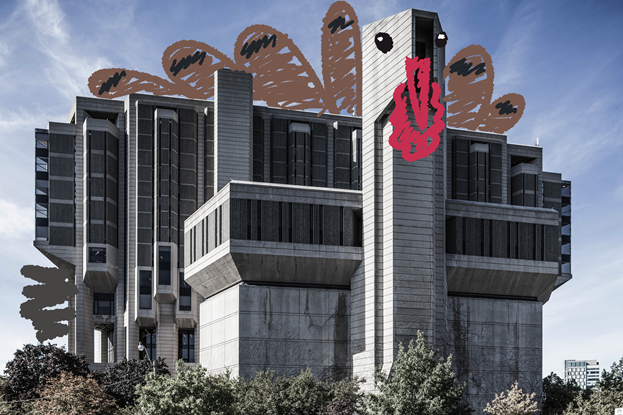Students planned to donate proceeds to support Black Lives Matter movement
On Thursday, June 4, the moderator and admin (modmin) team of the “UofT Memes for True [B]lue Teens” Facebook group received a trademark infringement notice from the University of Toronto (U of T), alleging that the products on the group’s Shopify store infringed the university’s intellectual property rights.
“UofT Memes for True [B]lue Teens” is a public group on Facebook that allows members to post and share memes related to the student experience at U of T. At time of publication, it has over 17,000 members and is open to anyone with a Facebook account to join. The group is run by four administrators and nine moderators, all of whom are current students or recent graduates of U of T.
“We are all students and cannot pay legal fees.”
Since in-person convocation was cancelled due to the COVID-19 pandemic, the modmin team originally looked into selling commemorative spoons – purely as a joke. It turns out making spoons was intensely challenging but the idea of giving a gift to the graduating class took hold. The team pivoted to selling shirts and other merchandise: tote bags, mugs, stickers, and even shower curtains. The merchandise featured memes and artwork by members of the modmin team and frequent contributors to the Facebook group.
The modmin team considered copyright and trademark infringement concerns during the design process. They discarded a design featuring the popular “Doomer girl” meme, avoided using U of T logos and crests, and often portrayed campus buildings in watercolour. The team settled on about 40 designs including: a drawing of the brown food truck, a popular food vendor on St. George Street, and a depiction of the John P. Robarts Research Library as a turkey.

Katie Kwang, a moderator of the Facebook group and a psychology and economics student at Victoria College, designed the website and coordinated the logistics behind the Shopify-hosted store. Kwang worked on the store for weeks: she sourced vendors, implemented drop-shipping, updated prices, and coordinated the promotional campaign.
The proceeds from the sales were to go to Black Lives Matter – Toronto, No One Is Illegal (Toronto), Native Canadian Centre of Toronto, and Black Legal Action Centre. The modmin team wanted to celebrate convocation and U of T meme culture while also bringing attention to the racial disparities in COVID-19 cases and the Black Lives Matter movement.
The store went live on June 2, the same day as U of T’s spring convocation and virtual ceremony.
On June 4, Kwang received a trademark infringement notice in an email from Shopify, notifying her that various merchandise had been reported as violating U of T’s trademarks. Shopify had already removed the allegedly infringing merchandise. The email directed Kwang to complete a “Response to Trademark Infringement Notice” form if she wished to dispute the claims but warned her that she may be liable for damages including legal fees if she did so.
Designs in the store allegedly violated five trademarks, including the words “University of Toronto”, “U of T”, and “Boundless”.
The Governing Council of the University of Toronto owns the school’s trademarks. According to a university spokesperson, “the University of Toronto’s Trademark Licensing Office is responsible for ensuring merchandise sold under the university’s name is consistent with our vision and values and is produced in humane and non-exploitative conditions.”
While the university allows registered student groups to use its trademark, the use must first be reviewed and approved by the Trademark Licensing Office. If an individual or an organization acquires the right to use U of T’s official marks, it has discretion as to how to allocate profits, if any, from merchandise sales. The Trademark Licensing Office reaches out to 10-20 merchandisers in any given year and asks them to discontinue sales of specific merchandise that violates policy and uses marks without permission.
Although there were some products in the store that were not part of the infringement notice, the modmin team decided to cancel existing orders and close the store. The team also chose not to contest U of T’s claims. “We are all students and cannot pay legal fees,” says Kwang. “Neither I nor the team is going to go through the ordeal of [legal action]. A meme is not worth the stress of worrying about a scholarship or my position at the school.” Kwang attends U of T on a scholarship for international students.
In the 36 hours since the store was launched, it received over 120 orders. After Kwang announced in the Facebook group on June 4 that the orders had to be cancelled, members were disappointed but largely supportive.
“It was very beautiful while it lasted.”
“I really did love the concept [of the store] because the meme page was a pretty relevant and hilarious constant for many of us during undergrad,” commented Parnian Tajbakhsh, a recent University College graduate from the neuroscience and cell & systems program who was also a frequent commenter in the Facebook group. “The merchandise really highlighted some iconic moments that brought the U of T community together and was a great reminder of different times throughout my undergrad. It would have been pretty funny to say that although I did not get a proper convocation, I did however get a commemorative spoon.”
“I am so stunned and impressed at the number of people who came together and made [the store] happen,” says Kwang. “It was very beautiful while it lasted.”





